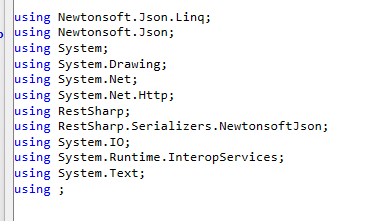klincecum
March 8, 2023, 3:02pm
21
Ok, here are my questions.
Is there anything in the first part (in trans) of your code, that is unique, but common to each record, that we could use as a “flag” or “identifier” of sorts, so we would know what to trigger off of in the standard
If so, I would first try to use the call context to store that information. But however you do it, if you
If the answer is yes, I will suggest a way to pull that data in standard.
Ricky90
March 8, 2023, 3:07pm
22
I think maybe the WarehouseGroupCode = “CAR” could be used.
Ricky90
March 8, 2023, 3:10pm
23
I only really need to focus on each individual record. and create an API post based on that 1 record.
klincecum
March 8, 2023, 3:18pm
24
I think I might have a more simple idea, but it only works if these come in batches.
For the first record, the call context should be blank most likely.
Choose a field say, “Character01”
each time the in-trans fires, add a row, serialized to json, to Character01 and add a delimiter like a pipe.
callContextBpmData.Character01 += JsonConvert.SerializeObject(yourRow) + "|";
when the standard fires, first, check and pull off the last pipe “|”
if( callContextBpmData.Character01.EndsWith("|") )
{
callContextBpmData.Character01 = callContextBpmData.Character01.Remove(callContextBpmData.Character01.Length - 1)
}
//or just
callContextBpmData.Character01.TrimEnd("|");
Then split that string into json strings:
List<string> rowsList = callContextBpmData.Character01.Split("|").ToList();
Then, clear the callContextBpmData.Character01 field:callContextBpmData.Character01 = ""
now you have the json for each row
you can deserialize that list back into actual rows, and get your data.
Ricky90
March 8, 2023, 3:21pm
25
and this would give me 1 record each time inside the standard directive?
klincecum
March 8, 2023, 3:25pm
26
It would give you 1 batch of records, for each time the in trans fired.
Say in trans had 10 records, in standard, the call context field would have a list of the 10 records that fired.
You foreach on that rowsList, and do your process for each record.
something like
foreach(var rowStringJson in rowsList)
{
MyTypeOfRow myrow = JsonConvert.DeserializeObject<MyTypeOfRow>(rowStringJson);
DoSomeActionOn(myRow.whatever);
}
Ricky90
March 8, 2023, 3:30pm
27
Hi, unsure on the adding a row on the first section. JsonConvert.SerializeObject(yourRow)
klincecum
March 8, 2023, 3:36pm
28
I was going off the cuff and not looking at your code
“your row” is whatever row you need to store data from in the first part.
I would guess each MtlQueue row.
Ricky90
March 8, 2023, 3:45pm
30
2 questions.
Am I still to use the foreach on all code blocks in Standard Directive?
Also, I’m getting an error below.
klincecum
March 8, 2023, 3:46pm
31
try ‘|’
on the other question, gimme a sec
klincecum
March 8, 2023, 3:48pm
32
In the standard directive, I think the only foreach would be on your
klincecum
March 8, 2023, 3:51pm
33
If you want to post the code instead of screenshots, I could edit it to make you a
“skeleton” to work off of and test.
Ricky90
March 8, 2023, 3:58pm
34
I currently have this but it throws a few errors.
if( callContextBpmData.Character01.EndsWith(“|”) )
List rowsList = callContextBpmData.Character01.Split(‘|’).ToList();
callContextBpmData.Character01 = “”;
foreach(var rowStringJson in rowsList)
DoSomeActionOn(myRow.whatever);
}
Ricky90
March 8, 2023, 3:59pm
35
maybe i dont have all the correct references.
klincecum
March 8, 2023, 4:05pm
36
MyTypeOfRow was for you to fill in with the type of row you are storing/retrieving.
Ricky90
March 8, 2023, 4:10pm
37
Sorry, you have lost me there.
klincecum
March 8, 2023, 4:14pm
38
You’ll be storing a row from MtlQueue, it has a type, I don’t know what that is off the top of
Ricky90
March 8, 2023, 4:21pm
39
Right, as in Anonymous, Dynamic and nullable types?



